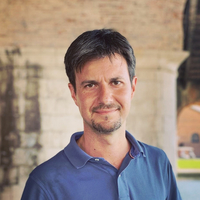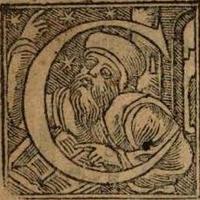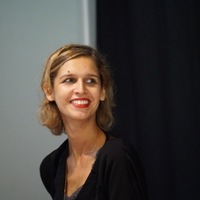
Mattia Cavagna
Address: Université catholique de Louvain
Faculté de Philosophe Art et Lettres
Place Blaise Pascal, 1
B- 1348 Louvain-la-Neuve
Faculté de Philosophe Art et Lettres
Place Blaise Pascal, 1
B- 1348 Louvain-la-Neuve
less
Related Authors
Benoit Milléquant
Université de Lille
Raphaël Cappellen
Université Paris Diderot
Laura Endress
University of Zurich, Switzerland
Irene Reginato
Università degli Studi di Udine / University of Udine
Amandine Mussou
Université Paris Diderot
Laurence Terrier Aliferis
University of Neuchâtel
Laurent Vissière
Paris Iv Sorbonne
InterestsView All (13)










Uploads
Videos by Mattia Cavagna
Books by Mattia Cavagna
Papers by Mattia Cavagna
The present article aims to present and discuss some of the key ideas concerning the so-called birth of Purgatory in the Middle Ages. Based on two different traditions of representing the Other World – on the one hand, the biblical descriptions of Ecclesiastes 9.10 and Mark 9.47, for example; on the other, apocryphal accounts such as the Apocalypse of Paul –, we try to demonstrate that the conception of an otherworldly place of temporary and individual punishment can be traced to Bede’s Vision of Dryhthelm (Historia ecclesiastica gentis anglorum V.12). Furthermore, we provide a translation of the aforementioned text, based on the Latin edition by Colgrave & Mynors (1969).
Bilan 2018-2019 ;
Cycle de conférences CEMR ;
Rétrospective Habiter le monde ;
Rétrospective Théâtre latin ;
Focus CERTA ;
Focus GRMF
The scope of this conference was to assess more precisely the place of Augustus in the Western historical and cultural memory, from the Antiquity and the Middle Ages onwards. To this end, it could be interesting to highlight not only the presence, but also the absence of Augustus – or of some facets of this figure. Here are therefore some of the questions to which our conference brought answers: to what extent and for which reasons was the remembrance of Augustus relatively “discrete” in some cultural contexts? which features of his historical figure were highlighted or passed over in silence? and why?
24 scholars from 10 countries, specialists of fields of study as various as history, cultural history, literature, art history, semiotics, etc., brought together their skills and knowledge to give some answers to those questions – and to many others. During three days, the talks and discussions contributed to cast a new light on the multiple aspects of the posthumous portrait of the first emperor which was in permanent evolution and “re-creation” during two millennia.
Belgium, France, Italy, from the Netherlands and from the United Kingdom, from Germany, Austria, and Poland, from Finland, even from the Canada, talks about the most various aspects of Augustus’ posthumous history.
Join our enthusiastic team of more than 20 teachers from Université Catholique de Louvain in an exciting journey, starting on May 3, 2018, thanks to our self-paced MOOC (Massive Open Online Course) «Oriental Beliefs: Between Reason and Traditions».
It is informative, funny and completely free. And there are absolutely no pre-requisites, except your own enthusiasm and sense of curiosity!
Enroll on edX: https://www.edx.org/course/oriental-beliefs-between-reason-and-traditions
Have you seen our social media yet?
That’s the place where you can get a sneak preview of all what you’ll be discovering through our MOOC «Oriental Beliefs: Between Reason and Traditions »!
Facebook https://www.facebook.com/orientalbeliefs/
Twitter https://twitter.com/OrientalBeliefs
Youtube Discover our MOOC and share our Teaser video
You’re passionate about Oriental cultures, past and present? You’re fascinated by myths, beliefs and mysteries? If so, join our enthusiastic team of more than 20 experts in an exciting 8-week journey, starting on 4 October 2016, thanks to our MOOC (Massive Open Online Course) «Oriental Beliefs: Between Reason and Traditions». It is informative, it is fun and it is completely free. Enroll on EdX platform: https://www.edx.org/course/oriental-beliefs-between-reason-louvainx-louv19x
About this course
This course takes a journey through the world of beliefs as they have developed in a great variety of cultures, ranging from Ancient Egypt, the Near East to Central Asia, India, China, and the Far East. We will discuss where these beliefs, theories and practices originated from, how they were passed on over the ages and why some are still so central to large communities of believers across the world today, whether it be amongst Jews, Christians, Muslims, Buddhists or Shintoists.
We'll be dealing with everything from gods and spirits, to angels and demons, to afterlife and the netherworld, as well as the great cycles of the universe and the tremendous power of lunar and solar eclipses. The interpretation of dreams and all sorts of magic and miraculous deeds will also be covered during this course.
Students will have the opportunity to travel extensively in time and space. The comparative, critical and contextualized approach of this course will allow for a valuable and thought-provoking experience.
We are a course team of about twenty-five specialists working at, or in close interaction with, the Department of Greek, Latin and Oriental Studies (GLOR) at the University of Louvain. We are all historians or philologists, all passionate about our respective fields of expertise, and all fully determined to help you as much as we can as we progress through this course. Most of all, we're looking forward to "meeting" you and to having lively discussions with you on the forums.
If you're curious about the cultures of this world, past and present, this course is definitely for you. Put your wings on and get ready to ride on our “GLOR-ious” dragon and to enjoy the whole adventure with us!
Join us also on Facebook
Have you seen our Facebook page yet? That’s the place where you can get a sneak peak of all what you’ll be discovering through our MOOC «Oriental Beliefs: Between Reason and Traditions »! Take a step into this marvelous scientific trip around Japan, India, Egypt, China, Mesopotamia and many more… and you’ll encounter an impressive number of angels, demons and fabulous tales along the way! https://www.facebook.com/orientalbeliefs/
Date limite de réponse : 14 février 2021